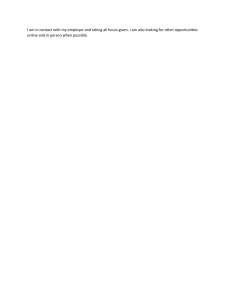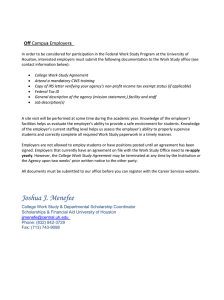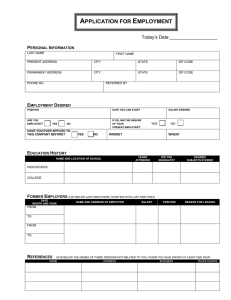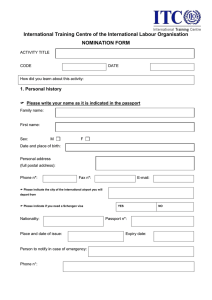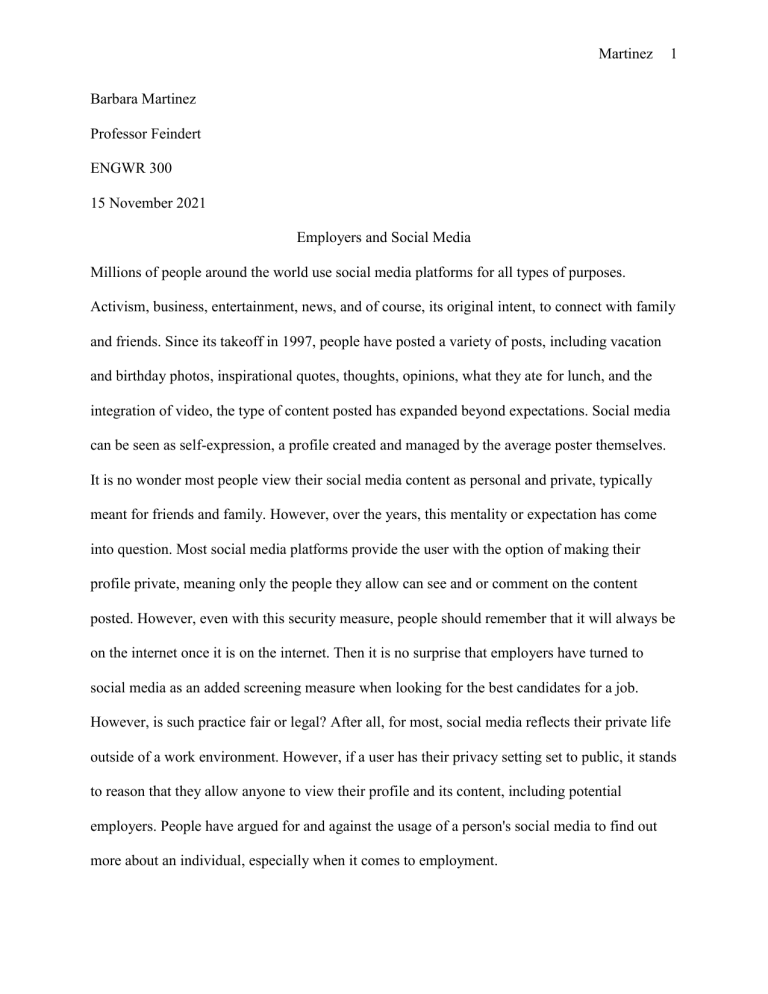
Martinez 1 Barbara Martinez Professor Feindert ENGWR 300 15 November 2021 Employers and Social Media Millions of people around the world use social media platforms for all types of purposes. Activism, business, entertainment, news, and of course, its original intent, to connect with family and friends. Since its takeoff in 1997, people have posted a variety of posts, including vacation and birthday photos, inspirational quotes, thoughts, opinions, what they ate for lunch, and the integration of video, the type of content posted has expanded beyond expectations. Social media can be seen as self-expression, a profile created and managed by the average poster themselves. It is no wonder most people view their social media content as personal and private, typically meant for friends and family. However, over the years, this mentality or expectation has come into question. Most social media platforms provide the user with the option of making their profile private, meaning only the people they allow can see and or comment on the content posted. However, even with this security measure, people should remember that it will always be on the internet once it is on the internet. Then it is no surprise that employers have turned to social media as an added screening measure when looking for the best candidates for a job. However, is such practice fair or legal? After all, for most, social media reflects their private life outside of a work environment. However, if a user has their privacy setting set to public, it stands to reason that they allow anyone to view their profile and its content, including potential employers. People have argued for and against the usage of a person's social media to find out more about an individual, especially when it comes to employment. Martinez 2 The first significant case is employers using social media as a screening tool. According to The European Journal of Social & Behavioral Sciences, “…organizations nowadays especially in the west, are utilizing it as a business tool especially in the context of employers using these SNS to screen job candidates” (Jaspreet Kaur). Employers want to hire a person with the right qualifications and experience for the job. After all, a company's success comes down to its employees, and without the right employees, a business may not succeed. Also, when making a hiring decision, an employer has to think about whether or not the person will be a good fit with the rest of the team and if the person falls in line with the company's values. It only takes one person to bring morale down, and from there, it is a domino effect, "Low employee morale is a silent killer of workplace productivity and performance” (Bell). Before social media, employers relied on the primary phone call interview and then a face-to-face interview to determine if the applicant would be a good fit. Typically, this included seeing if the candidate was well-spoken, how they dressed for the interview, their body language, and whether they seemed truthful and simply an overall feel for the person. Of course, this is not always 100% accurate. Most employers will admit to choosing a "bad hire" after a stellar interview process. Now, however, employers have an added tool at the tip of their fingers to get a better insight into an applicant's life and how they conduct themselves, and that is social media. “Social media is used by potential employers to check job applicants' qualifications, assess their professionalism and trustworthiness, reveal negative attributes, determine whether they post any problematic content and even assess "fit” (Anatoliy Gruzd). For example, an applicate has met all the qualifications, has the skillset, does great in the face-to-face interview, but when the potential employer finds their social media platform, it has pictures of the applicant participating in drug use and posts about calling out "sick" in order to go out with friends. Deciding to bypass the applicant, the Martinez 3 employer may feel they "dodged a bullet." On the other hand, people are human, and perhaps most make an effort not to judge others unfairly. When screening applicants, it is critical to remain unbiased, but being of human nature, can leaving personal beliefs and preferences aside be guaranteed? Laws were created to prevent discrimination. However, there is no one in the employer’s office ensuring that they are being compliant. For example, an employer reviews a resume, looks up the applicant's social media, sees that they were of a particular race, and then moves on to the next applicant. The next case is that social media saves employers time and money. By utilizing social media as a means of screening, they can avoid hiring someone that could potentially cost them time and money and save themselves from both in the long run. According to the U.S Department of Labor, “…the average cost of a bad hire is up to 30% of the employee’s first-year earnings” (Solutions). Typically, companies have policies to ensure that the employee is given a fair opportunity to succeed and provided with additional training, routine follow-up meetings, and possibly a peer review of their work. As helpful as they may be, all these resources take away time from other company employees and reduce productivity. If the employee does not improve and is terminated, the employer has lost substantial money. On the other hand, utilizing social media through a human search or a program designed to search for the employer does not always prove to be the cost-saving measure one might think. In recent years, companies have developed artificial intelligence software to help companies with the screening process. What used to take an enormous amount of time now only takes seconds. The program searches all media platforms for any questionable content, including pictures and specific words and phrases, and puts through an algorithm that flags social media posts with questionable or unfavorable content. Nevertheless, like the human version, these programs are not perfect. As most people know, Martinez 4 what is viewed on social media is not always what it seems and can be misunderstood if the context is not available. A post may be made in jest or meant as an inside joke, essentially harmless. What is more concerning is that people can make false social media accounts in a person's name and photo and add harmful content. These are also referred to as "fake accounts." Computer and programming savvy people can also hack an individual's account and post false information and or content derogatory in nature. Applicants that may have been assets to the company financially and production-wise can be instantly dismissed based on lack of context or falsely portrayed on social media. Lastly, social media has helped identify the need for laws and regulations. As social media rose in popularity, so did issues in legality. Social media was now at the center of a legal and social debate. Soon, lawmakers began to assess and create laws at the state and federal level that included the already existing Title VII of the Civil Rights Act of 1964 federal law that protects employees against discrimination based on race, color, national origin, sex, and religion. “Federal law prevents employers from discriminating against an employee because of their personal social media, and employers can legally terminate employees for a number of reasons that they may not truthfully disclose. Employers may also use these platforms as informal background checks on a potential employee. As long as regulations are evolving, be aware of your state's laws concerning social media and employee rights…" (Alison Pearson). However, the law usually falls behind in keeping up with social media platforms as they continue to evolve. Most legal cases involving social media and employers typically occur post-hiring when an employee's social media post creates an issue and comes into scrutiny. An employer may terminate the employee without fully knowing the law resulting in the employee's rights being violated, with the employer paying costly legal fees and compensation. Also, laws vary from Martinez 5 state to state, and cases that go to trial are scrutinized on both sides of the complaint, proving that having a company policy does not always cover the employer. Navigating through the advancements of social media is not an easy process. As seen throughout the years, social media has many positive aspects that people all over the world utilize and enjoy but also seen are the complications that arise, especially for those looking for employment and those looking to employ. For both, knowing the laws and being aware of social media content is essential in potentially avoiding employment and legal issues. Martinez 6 Works Cited Alison Pearson, Rudri Bhatt Patel. Social Media and the Law 5 Things You Need to Know. 27 September 2021. November 2021. <https://www.legalzoom.com/articles/social-mediaand-the-law-5-things-you-need-to-know>. Anatoliy Gruzd, Elizabeth Dubois, Jenna Jacobson. Companies are increasingly turning to social media to screen potential employees. 8 July 2020. November 2021. <https://theconversation.com/companies-are-increasingly-turning-to-social-media-toscreen-potential-employees-141926>. Bell, Ashley. How to Detect and Correct Low Employee Morale Before it Spreads. n.d. November 2021. <https://snacknation.com/blog/low-employee-morale/>. Jaspreet Kaur, Sheila Arianayagam, Parmjit Singh. "The Usage of Social Media Networks as a Tool by Employers to Screen Job Candidates." August 2020. ProQuest. November 2021. <https://caccllrccd.primo.exlibrisgroup.com/discovery/fulldisplay?docid=cdi_proquest_journals_2444 523085&context=PC&vid=01CACCL_LRCCD:crc&lang=en&search_scope=crc_everything &adaptor=Primo%20Central&tab=everything&query=any,contains,;using%20social%20 media>. Solutions, Apollo Technical Engineered Talent. THE COST OF A BAD HIRE AND RED FLAGS TO AVOID (2021). 16 September 2021. November 2021. <https://www.apollotechnical.com/cost-of-a-bad-hire/>. Martinez 7

